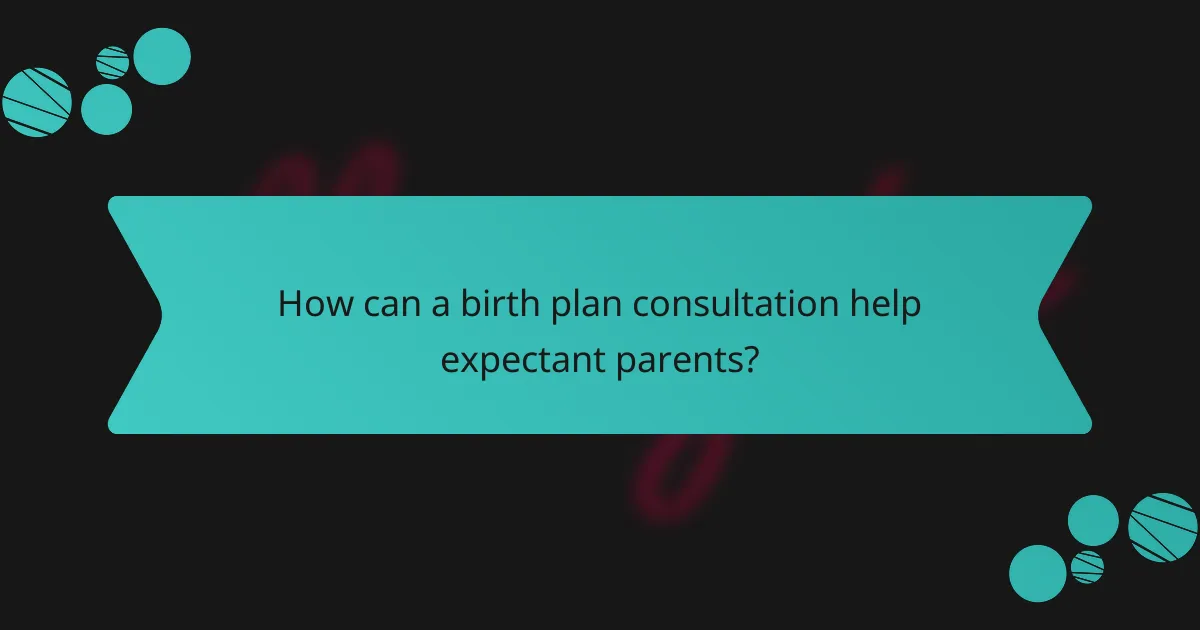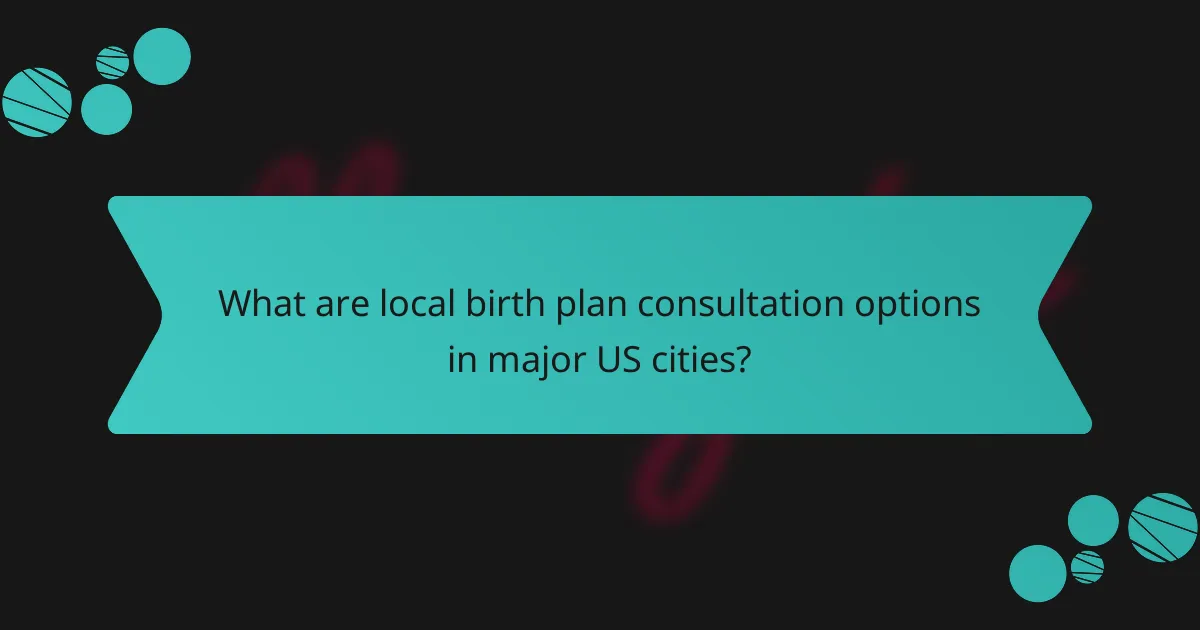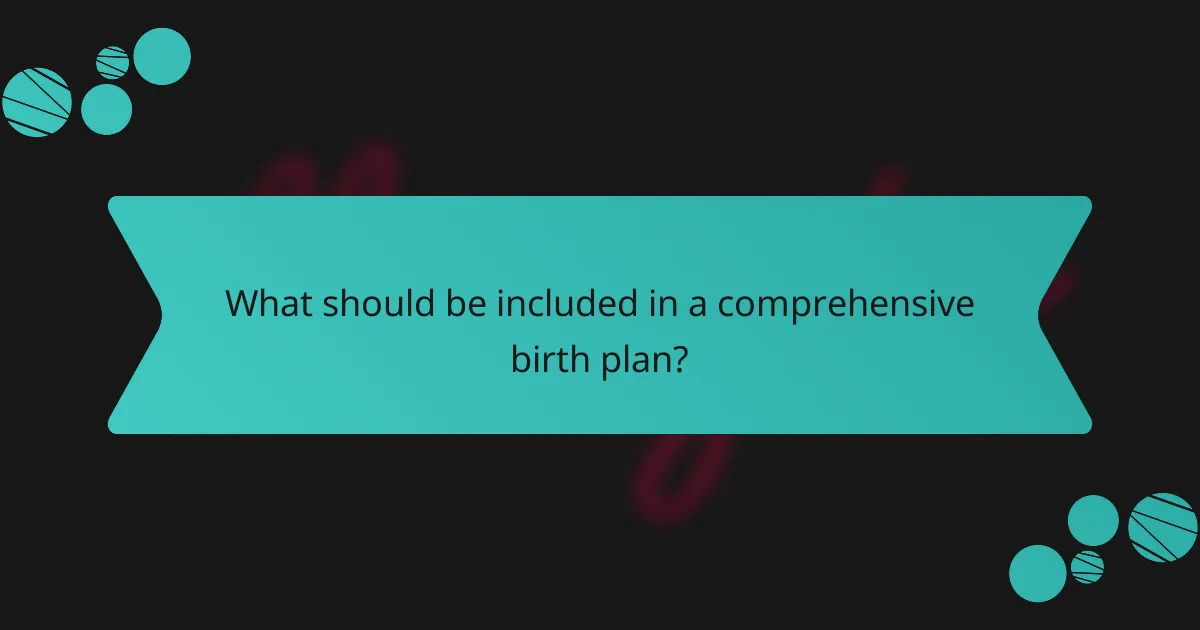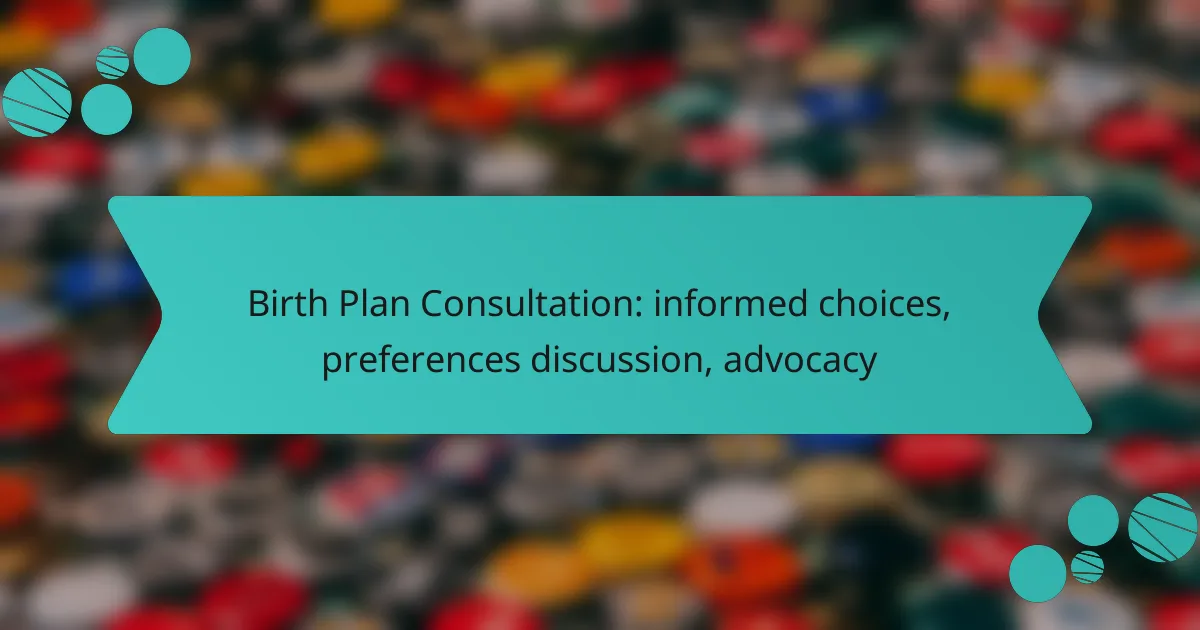A birth plan consultation is an essential step for expectant parents, providing a platform to clarify their preferences and choices for labor and delivery. This collaborative discussion empowers families to communicate effectively with healthcare providers, ensuring a more personalized and fulfilling birthing experience.

How can a birth plan consultation help expectant parents?
A birth plan consultation assists expectant parents by clarifying their preferences and choices for labor and delivery. This process empowers them to communicate their desires effectively with healthcare providers, ensuring a more personalized and satisfying birth experience.
Personalized birth plan development
Personalized birth plan development involves creating a tailored document that reflects the specific wishes and needs of the parents. During the consultation, parents can discuss their preferences regarding pain management, birthing positions, and support people present during labor.
It’s beneficial to consider various options available in your area, such as home births, hospital births, or birthing centers. This helps in aligning the birth plan with the chosen setting and available resources.
Informed decision-making support
Informed decision-making support is crucial for expectant parents to understand the implications of their choices. A consultant can provide evidence-based information on various procedures, interventions, and potential outcomes, allowing parents to weigh the pros and cons effectively.
Parents should ask questions about common practices in their chosen facility, such as the use of continuous fetal monitoring or routine interventions. This knowledge helps them make choices that align with their values and comfort levels.
Advocacy for patient preferences
Advocacy for patient preferences ensures that the wishes of expectant parents are respected during labor and delivery. A birth plan consultant can help articulate these preferences clearly, making it easier for healthcare providers to understand and support them.
It’s essential to communicate the birth plan to the medical team upon arrival at the facility. Parents should also consider designating a support person who can advocate on their behalf if needed, ensuring that their preferences are honored throughout the birthing process.

What topics are covered in a birth plan consultation?
A birth plan consultation typically covers key topics that help expectant parents outline their preferences for labor, delivery, and postpartum care. This discussion ensures that families make informed choices and feel supported throughout the birthing process.
Labor preferences and pain management
During the consultation, parents can express their preferences regarding labor and pain management techniques. Options may include natural methods like breathing exercises and hydrotherapy, as well as medical interventions such as epidurals or analgesics.
It’s important to consider the potential benefits and drawbacks of each method. For example, while an epidural can provide significant pain relief, it may also slow down labor or limit mobility. Discussing these factors with a healthcare provider can help clarify the best approach for individual needs.
Postpartum care options
Postpartum care options encompass the physical and emotional support available after childbirth. This can include discussions about breastfeeding, pain management, and mental health resources, which are crucial for recovery.
Parents should explore available services, such as lactation consultants or postpartum doulas, to assist during this period. Understanding local resources can help ensure a smoother transition into parenthood and promote overall well-being.
Support person involvement
Identifying the role of support persons during labor and delivery is a vital part of the birth plan consultation. Parents can discuss who will be present, their desired involvement, and any specific tasks they may take on, such as providing comfort measures or advocating for the parent’s wishes.
Clear communication about expectations can enhance the support experience. For instance, designating a primary support person can help streamline decision-making and ensure that the birthing environment aligns with the parent’s preferences.

What are the benefits of creating a birth plan?
Creating a birth plan offers several advantages, including clearer communication with healthcare providers and increased confidence during labor. It helps expectant parents articulate their preferences and make informed choices about their birthing experience.
Enhanced communication with healthcare providers
A birth plan serves as a valuable tool for enhancing communication between expectant parents and their healthcare team. By outlining preferences regarding labor, delivery, and postpartum care, parents can ensure that their wishes are understood and respected.
Consider discussing your birth plan during prenatal visits to clarify any questions or concerns. This proactive approach can help identify potential challenges and align your expectations with the medical team’s capabilities.
Increased confidence during labor
Having a birth plan can significantly boost confidence during labor by providing a sense of control over the birthing process. When parents know what to expect and have outlined their preferences, they are more likely to feel empowered and less anxious.
To maximize this benefit, include specific details in your plan, such as preferred pain management techniques or positions for labor. This preparation can help you feel more prepared and supported during the experience.
Alignment of expectations
Creating a birth plan helps align expectations between parents and healthcare providers, reducing the likelihood of misunderstandings. When both parties are on the same page, it fosters a more collaborative environment during labor and delivery.
Regularly review and update your birth plan as needed, especially if circumstances change. This flexibility ensures that your preferences remain relevant and can be accommodated by your healthcare team, leading to a more satisfying birth experience.

How to choose a birth plan consultant?
Choosing a birth plan consultant involves assessing their qualifications, consultation style, and client feedback. A good consultant will help you navigate your preferences and advocate for your choices during labor and delivery.
Qualifications and experience
When selecting a birth plan consultant, review their qualifications and experience in the field of maternity care. Look for certifications from recognized organizations, such as the International Childbirth Education Association (ICEA) or the Lamaze International certification.
Experience is equally important; a consultant with several years of practice may have encountered a variety of scenarios, equipping them to better support your needs. Consider asking about their experience with specific birth settings, such as hospitals, birthing centers, or home births.
Consultation style and approach
The consultation style of a birth plan consultant can significantly impact your experience. Some consultants may adopt a more hands-on approach, while others might focus on providing information and allowing you to make decisions independently.
Determine what works best for you by asking potential consultants about their methods. Do they prioritize informed consent and shared decision-making? Are they open to discussing alternative options? Understanding their approach will help ensure alignment with your values and preferences.
Client testimonials and reviews
Client testimonials and reviews provide insight into the effectiveness of a birth plan consultant. Look for feedback on their ability to listen, support, and advocate for clients during labor and delivery. Online platforms, such as social media or dedicated review sites, can be valuable resources.
Consider reaching out to past clients for direct experiences. Their insights can help you gauge whether a consultant’s style and expertise align with your expectations, ultimately aiding in your decision-making process.

What are local birth plan consultation options in major US cities?
Major US cities offer various birth plan consultation options, allowing expectant parents to discuss preferences, make informed choices, and receive advocacy. These services can range from individual consultants to group classes, catering to different needs and budgets.
Los Angeles birth plan consultants
In Los Angeles, several birth plan consultants provide personalized services to help parents outline their preferences for labor and delivery. Many consultants offer one-on-one sessions, which can include discussions about pain management options, birthing locations, and postpartum care.
Popular options include organizations like The Bump Club and Birth Education Center, where parents can attend workshops or schedule private consultations. Prices typically range from $100 to $300 per session, depending on the consultant’s experience and the services provided.
New York City birth plan services
New York City boasts a variety of birth plan services, including both in-person and virtual consultations. Many doulas and childbirth educators in the city focus on empowering parents through education and support, helping them create a comprehensive birth plan tailored to their needs.
Organizations such as Carriage House Birth and Mama Natural offer workshops and private consultations, with costs generally between $150 and $400. It’s advisable to book early, as popular consultants can fill their schedules quickly.
Chicago birth plan advisors
In Chicago, birth plan advisors provide essential guidance for expectant parents looking to navigate their options. Many advisors offer workshops that cover various topics, including hospital policies, birth interventions, and creating a supportive environment during labor.
Notable services include Chicago Family Doulas and The Chicago Birth Center, where parents can access both group classes and individual consultations. Fees for these services usually range from $100 to $250, making it important to compare options to find the best fit for your needs.

What should be included in a comprehensive birth plan?
A comprehensive birth plan should outline your preferences for labor, delivery, and postpartum care. It serves as a guide for healthcare providers to understand your choices and advocate for your needs during the birthing process.
Informed choices
Informed choices involve understanding the various options available during labor and delivery. This includes pain management methods, types of delivery (vaginal or cesarean), and interventions like episiotomies or continuous fetal monitoring. Researching these options and discussing them with your healthcare provider can help you make decisions that align with your values and preferences.
Consider attending childbirth education classes to gain insights into the birthing process. These classes often cover topics such as the stages of labor, coping techniques, and the role of support persons. Being well-informed can empower you to advocate for your choices effectively.
Preferences discussion
Discussing your preferences with your healthcare team is crucial for a successful birth experience. This conversation should cover your desires for labor support, environment (like lighting and music), and any specific requests regarding who will be present during the birth. Make sure to communicate your preferences clearly and ensure everyone involved understands them.
It may be helpful to create a written summary of your preferences to share with your healthcare team. This can include a list of must-haves, nice-to-haves, and deal-breakers. Regularly revisiting this document as your due date approaches can keep everyone aligned with your wishes.
Advocacy
Advocacy in the context of a birth plan means ensuring your voice is heard during labor and delivery. This can involve having a designated support person, like a partner or doula, who can help communicate your preferences and needs if you are unable to do so. Their presence can provide emotional support and help navigate any unexpected situations.
Be prepared for the possibility that circumstances may change during labor. Having a flexible mindset while still advocating for your core preferences can lead to a more positive experience. Discuss with your healthcare provider how they will support you in making informed decisions if adjustments are needed during the process.
